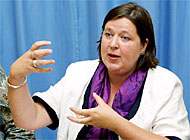WTO under pressure to defend poor instead of profits

Non-governmental organisations have stepped up calls on the World Trade Organisation (WTO) to amend its rules on patent protection so that developing countries can obtain life-saving drugs.
The appeal came ahead of a WTO meeting on Wednesday – its first ever discussion on how the TRIPS agreement, which governs intellectual property rights, affects access to medicines.
The meeting in Geneva is a regular session of the WTO council, which oversees the Agreement on Trade-Related Aspects of Intellectual Property Rights, to give TRIPS its full title.
But at the request of more than 30 African countries, member states held a special one-day discussion on how TRIPS may be reducing the availability of vital medicines in the Third World.
According to NGOs, TRIPS prevents developing countries from implementing effective public health policies, because it allows the big pharmaceutical companies, such as the Swiss giants Roche and Novartis, to snuff out competition and charge exorbitant prices.
“Today there is a dire imbalance between the sanctity of patents and the health of people. Essential medicines are not CD-Roms or Barbie dolls. For millions of people, they are a matter of life and death,” says Ellen’t Hoen of Médecins sans Frontières (MSF).
A statement, endorsed by 110 NGOs, reminds the WTO that access to essential medicines is a fundamental human right, and that saving lives must take precedence over profits.
The Geneva meeting follows the decision in April of Roche, Novartis and 37 other pharmaceutical companies to drop their legal action against the South African government, which wanted to import generic medicines – cheap versions of patented drugs – to help cope with the devastating AIDS epidemic sweeping the country.
HIV and AIDS
Despite the jubilation that followed that decision, it was not necessarily the watershed many NGOs hoped it would be. A United States complaint against Brazil, the only developing country to provide all HIV and AIDS sufferers with free treatment, is still pending at the WTO. If it is found that Brazil is flouting international patent rules by producing generic anti-AIDS medication, it would put a halt to the Brazilian programme and threaten similar projects in other developing countries.
The Africans nations which requested the Geneva debate would like to see greater flexibility within TRIPS, to allow them to deal more effectively with health catastrophes. The WTO argues that this flexibility already exists; it just needs spelling out more clearly.
“It may be that TRIPS does not need tightening up. It may be more a question of certain countries having a clearer idea of what they’re allowed to do,” says Peter Ungphakorn, the WTO’s information officer responsible for intellectual property matters.
Nevertheless, it is believed a number of countries may want this clarification in writing. This meeting is highly unlikely to produce a text on which everyone can agree. It is, the WTO points out, mainly an opportunity for member governments to air their views, and explain how they interpret the accord.
“Hopefully, we can help those countries that are uncertain or hesitant about using the flexibility that’s allowed under the agreements to feel more secure about what they can and can’t do,” he told swissinfo. Any written declaration will probably have to wait until November’s WTO ministerial meeting in Doha at the earliest. “It is up to the members,” Ungphakorn says.
Rapid action
However, NGOs are encouraged by a significant shift in the position of the European Union, which will tell the meeting that “rapid action” is necessary, and that criticism of the TRIPS agreement should be taken seriously. The EU says TRIPS cannot be blamed for health crises in developing countries, but nor should it stand in the way of action to combat them.
The WTO says governments have a number of ways of ensuring that a product is made available in their market, when the company that holds the patent does not supply it. These include parallel imports, whereby the government can import it from a country where it is supplied, and compulsory licences, when the state authorises another company to produce the product within the country.
“We have to strike a balance between long-term and short-term interests,” says Ungphakorn. “The long-term social interest is in encouraging invention and the best way of doing that is giving people protection over the intellectual property.”
“In the short-term some drugs may be too expensive or difficult to obtain, which is why we have this flexibility built in,” he explains. The problem is that a government must go through a number of steps before it can take advantage of this, and it is this procedure that many feel should be clarified.
NGOs like MSF, Oxfam and Third World Network argue that the big pharmaceutical firms and western governments have been putting pressure on these countries not to utilise these mechanisms.
“We want the EU and especially the US to stop harassing countries that make use of these provisions,” says Ellen’t Hoen.
“Innovation needs to be recognised, but it makes little sense unless the people who’ll benefit get access,” she adds.
by Roy Probert

In compliance with the JTI standards
More: SWI swissinfo.ch certified by the Journalism Trust Initiative








You can find an overview of ongoing debates with our journalists here . Please join us!
If you want to start a conversation about a topic raised in this article or want to report factual errors, email us at english@swissinfo.ch.